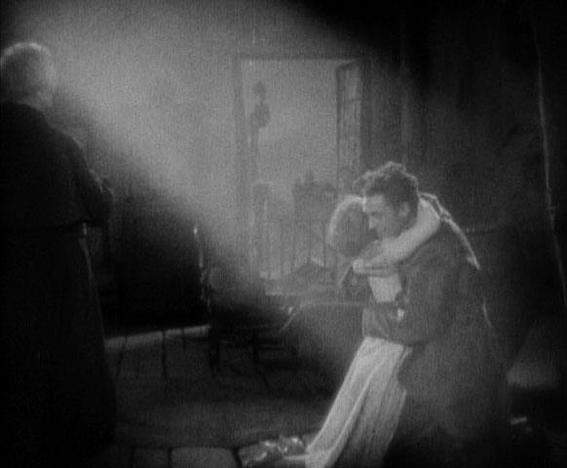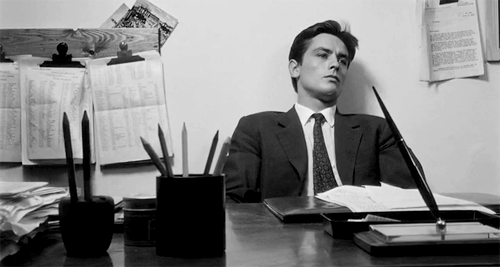It's approximately three in the morning, and I'm still stinging from my most recent failure. I'd been working for the past few days, creating a graphic to iron on a dress I found at a thrift store. I overcame countless obstacles and went to great trouble, spending my time and money on this pointless project.
Let's just say it did not end well.
I chose the wrong kind of transfer paper. I accidentally ruined half of the image. The other half didn't iron on properly because the dress was sliding all over the place.
My money, my time, gone. I could have been doing so many other things than sitting on the computer erasing minuscule pixels from the edge of a photo of Alain Delon and Monica Vitti. I tried to salvage the "rustic" looking dress by throwing colors over it, chucking it in the washing machine, but it was useless. I could not redeem this unique-looking dress, especially not when the image of my goal was in my mind torturing me. I sit here now and feel a stab of pain at the thought of what I wanted to accomplish and couldn't.
This seems to be a pattern for me. I want to do something, go somewhere, be somebody; so, I spend tons of money buying useless supplies, research incredible learning opportunities, start a blog. But everything ends in either diminished inspirational powers or complete, humiliating, catastrophic failure. I'm reminded of the time I planned to go to Prague before a doctor told me I shouldn't, because my stomach ailments were too concerning for me to travel alone. Or the time I went halfway across the world to (basically) meet Michael Ball (I love him), and failed to see him outside the stage door; I cried my heart out in that hotel shower, feeling beyond stupid. I'm reminded of the countless times I've started to write a story and never finished it, felt the rush of exhilaration and possession that comes with a big idea. The idea always died a slow, uneventful death. Every single time.
Why do I try? Why do I keep doing these things that, for someone like me, someone meek and bland, are useless? With every hollow attempt for greater things, I hurt myself more and more with the knowledge that I'm incompetent. I hear stories from every corner of my 'social circle' about people who know the career they want, have made a leap of faith and skipped off to a new country to find themselves. People everywhere make their livings on the internet, and people despise and adore them for the simple things they do daily. So, what the heck am I doing?
I'm trying to be liked other people, that's what. It's pitiful, and not at all aligned with the strength of character I try to claim. The more I think about it, the more I'm convinced that I am the truly accomplished one, while the 'put-together' people around me are not. Sure, they're walking down a straight line, living a happy, secure, comfortable life. But, hey, looking straight ahead is boring. If you have your eyes locked on success, you miss everything around and behind you!
Now, as for me: my eyes are all over the place. I drive top down around roads that are nothing but curvy, tangled lines. Right as I'm driving past literature, I make a beeline for religion, then turn a corner for theater, then reverse because I missed some movies I wanted to see. My music library has everything from Frankie Valli to Vox Lumiere, and I'll eat anything put on my plate. Not to brag, but my horizons are pretty freaking broad.
Maybe the problem isn't that I suck at being successful. Maybe I just have too much on my mind! How can anyone expect me to focus on buying a house when I have French to learn, and pointless blog posts to write, and fictional men to cry over? And I do think it's a matter of expectations. I wouldn't have tried nearly so hard, had I not been born in such an ambitious world. Modern society draws "success" in one-dimensional shapes: - flat, square diplomas, oblong outlines of office buildings, smooth, round tables at Starbucks where supposedly world-crushing struggles are hashed out over cups of grande-sized syrupy sludge. Everyone with a sense of self-importance is actually trapped inside the geometry of our world's collectively narrow minds.
Reader... If you have ever felt the way I feel... If what you want in life has ever differed from what your family and friends expect, if you have ever wondered why you can't do anything right... Reader, you and I are succeeding, and in an arena far larger and more impressive than that of the daily grind.
We are victors in the fields of art and spirit. We don't just look at a gatepost, we see the whole fence. We know there is more to life than what we'll do next week, next month, next year, because we don't just live life, we love it. We are multi-taskers; we see, smell, hear, read, listen, think, dream, all at once. We don't waste our energy on fleeting everyday tasks, because we're too busy climbing toward transcendency. We are far from incompetent, we are brilliant.
Guys, we don't have time to stress the small stuff! Reader, readers, you and I are going to make a pledge. From this day forward... We will not bring ourselves down. We will not mourn our 'failures'. We will not take one step forward to measure up against 'the successful'. Instead... We will run amuck. We will embrace creativity and discovery and madness, regardless of whether it leads us to comfort or chaos. We will not wear blinders when we walk. We will happily look everywhere, and let our feet find the future later.
I started this blog with the vain hope that people would read it and share it and give me a purpose in life. But, you know what? I don't care if anyone reads it. I am getting the truth out there. I am being creative and courageous. As for a job, and a relationship, and a life? Sorry, not concerned. I'm too busy deciding where to take my heart next. It has a busy schedule.



.jpg)















